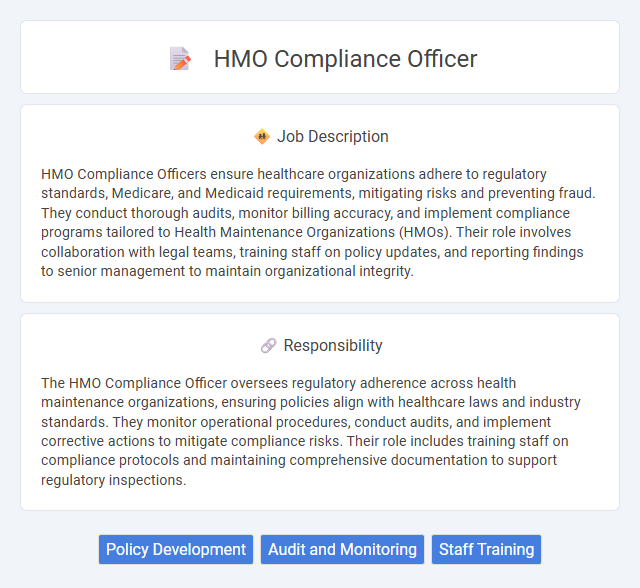
HMO Compliance Officers ensure healthcare organizations adhere to regulatory standards, Medicare, and Medicaid requirements, mitigating risks and preventing fraud. They conduct thorough audits, monitor billing accuracy, and implement compliance programs tailored to Health Maintenance Organizations (HMOs). Their role involves collaboration with legal teams, training staff on policy updates, and reporting findings to senior management to maintain organizational integrity.
Individuals with strong attention to detail and an interest in healthcare regulations are likely suitable for an HMO Compliance Officer role. Those comfortable with analyzing policies and ensuring adherence to legal standards may find the responsibilities manageable and rewarding. People who prefer routine and structured environments might have a higher probability of thriving in this position.
Qualification
HMO Compliance Officers typically require a bachelor's degree in health administration, public health, or a related field, combined with in-depth knowledge of healthcare regulations and standards. Professional certifications such as Certified Compliance and Ethics Professional (CCEP) or Certified in Healthcare Compliance (CHC) enhance credibility and expertise. Strong analytical skills, attention to detail, and experience with regulatory audits and risk management are essential for effective HMO compliance oversight.
Responsibility
The HMO Compliance Officer oversees regulatory adherence across health maintenance organizations, ensuring policies align with healthcare laws and industry standards. They monitor operational procedures, conduct audits, and implement corrective actions to mitigate compliance risks. Their role includes training staff on compliance protocols and maintaining comprehensive documentation to support regulatory inspections.
Benefit
An HMO Compliance Officer likely ensures that healthcare organizations adhere to regulatory standards, reducing the risk of legal penalties and enhancing patient safety. This role probably contributes to improved operational efficiency by identifying and addressing compliance gaps. Organizations may benefit from enhanced reputation and trust through consistent enforcement of healthcare policies.
Challenge
The role of an HMO Compliance Officer likely involves navigating complex regulatory environments, ensuring all housing regulations are consistently met to avoid legal penalties. Challenges may arise from keeping up-to-date with frequent legislative changes and managing diverse stakeholders, including landlords and tenants. Maintaining thorough documentation and conducting regular inspections could require meticulous attention to detail and strong problem-solving skills.
Career Advancement
HMO Compliance Officers play a critical role in ensuring health maintenance organizations adhere to regulatory standards and internal policies, directly impacting organizational integrity. Career advancement opportunities often include progressing to senior compliance roles, risk management positions, or executive roles such as Chief Compliance Officer, facilitated by continuous education and certifications in healthcare law and ethics. Mastery in regulatory frameworks like HIPAA and expertise in audit processes significantly enhance prospects for leadership and specialized compliance management positions.
Key Terms
Policy Development
HMO Compliance Officers play a critical role in policy development, ensuring health maintenance organizations adhere to regulatory standards and operational guidelines. They analyze existing policies, identify gaps in compliance, and draft new procedures to mitigate risks and promote ethical practices. Their expertise in regulatory frameworks enhances organizational accountability and supports continuous quality improvement.
Audit and Monitoring
HMO Compliance Officers specialize in conducting rigorous audits and continuous monitoring to ensure adherence to health maintenance organization regulations and standards. They analyze operational procedures, identify compliance risks, and implement corrective actions to maintain regulatory alignment and improve quality of care. Expertise in regulatory frameworks such as HIPAA and CMS guidelines is essential for effective compliance oversight and risk management.
Staff Training
The HMO Compliance Officer ensures that staff training programs adhere to regulatory standards and enhance knowledge of health maintenance organization policies. Developing targeted training modules improves employee understanding of compliance requirements, reducing the risk of violations. Regular assessment and updates to training materials maintain alignment with evolving healthcare laws and organizational procedures.
 kuljobs.com
kuljobs.com